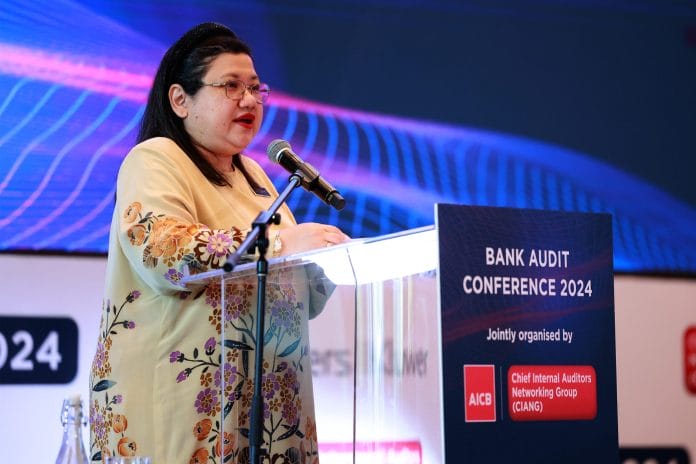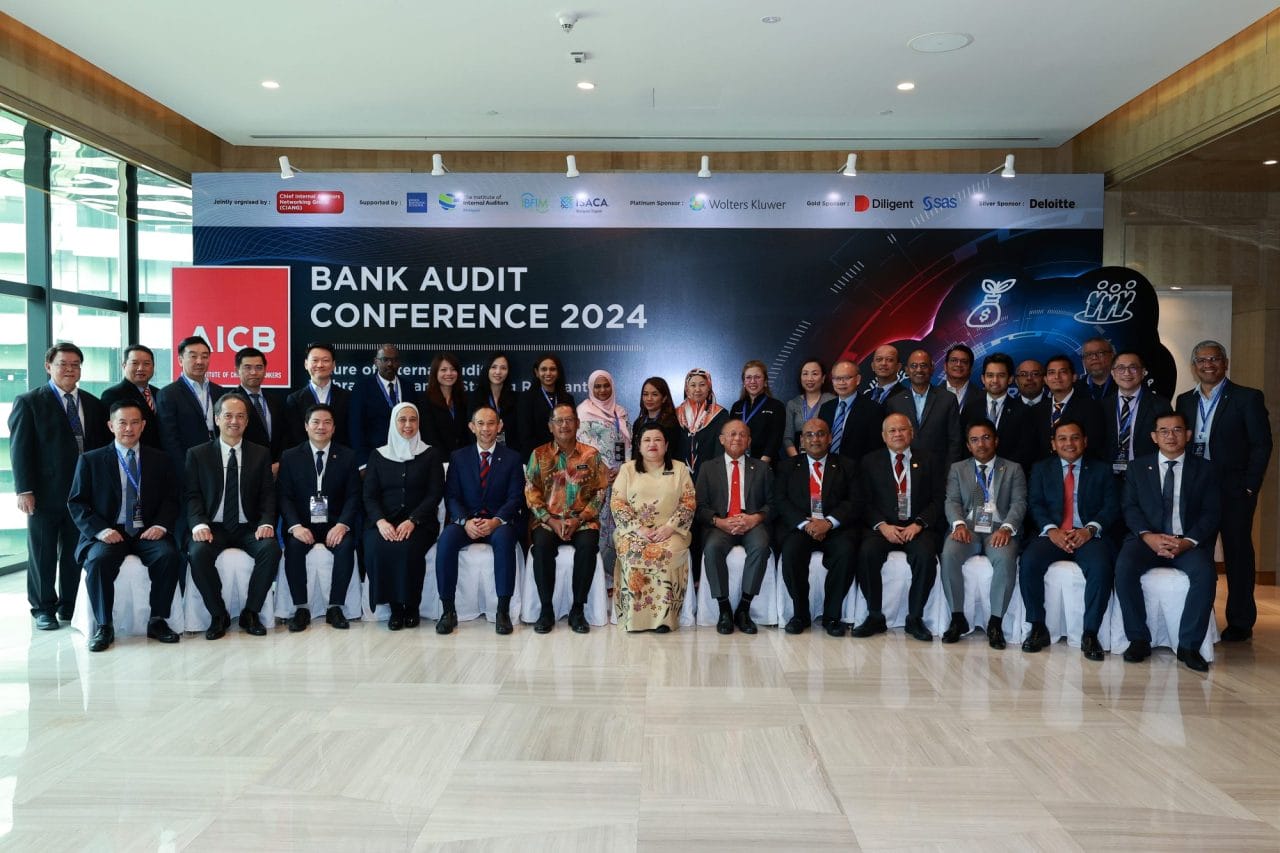As financial institutions worldwide are being disrupted on multiple fronts in an era marked by climate action and digitalisation, greater expectations are placed on internal auditors in the banking sector to stay ahead of the curve by upskilling and leveraging technological advancements to meet the changing industry and regulatory demands.
The inaugural Bank Audit Conference 2024 (BAC 2024) themed “Future of Internal Audit — Embracing Change, Staying Relevant” held on 6–7 March 2024 in Kuala Lumpur was jointly organised by the Asian Institute of Chartered Bankers (AICB) and its Chief Internal Auditors Networking Group (CIANG) and officiated by Datuk Wan Suraya Wan Mohd Radzi, Auditor-General of Malaysia today (Mac 7).
Wan Suraya, in the Keynote Address said: “The financial sector is experiencing a period of unprecedented change. From the rise of fintech giants to the ever-present threat of cybercrime, the traditional banking model is being challenged and redefined. In this dynamic environment, the internal audit function within banking institutions must not only adapt but also embrace change to stay relevant.
“In the context of the banking industry, it is crucial for the internal auditors to continually rethink and reshape its function to support the challenging and complex role of banks for effective governance, risk management and compliance.”
The Auditor-General added, in the context of the banking industry, it is crucial for the internal auditors to continually rethink and reshape its function to support the challenging and complex role of banks for effective governance, risk management and compliance.
Wan Suraya said the joint efforts by internal and external auditors helps to strengthen internal controls: Internal auditors identify areas for improvement, which external auditors can then verify and validate; increase transparency and trust: both internal and external auditors contribute to a more transparent and trustworthy financial environment within the bank and minimise risk and fraud: By working together, they create a more robust system for identifying and mitigating potential risks and preventing fraudulent activities.
“The future demands agility and adaptability to effectively address emerging risks such as those associated with new technologies and evolving regulatory requirements, internal audit must shift from solely relying on periodic audits to continuous auditing and monitoring.
“Technology will be at the forefront of internal audit. Artificial intelligence, machine learning, and data analytics will revolutionise the way audits are conducted. Automation will streamline processes, enhance accuracy, and provide deeper insights into risks and opportunities.
“Internal audit should evolve from a solely compliance-driven function to a strategic partner. Internal audit cannot operate in isolation; it must work closely with other functions within the organisation. By collaborating with management and other lines of defence, internal audit can provide valuable insights and guidance that contribute to achieving the bank’s strategic objectives,” she said, adding, the future of internal audit specifically in banking institutions is one of transformation, continuous learning, and embracing the ever-changing landscape.
These competencies, combined with appropriate audit methodologies, tools, and a strong foundation in auditing techniques, will equip internal auditors to address the evolving needs of the banking sector. To ensure they remain effective, internal auditors should receive ongoing training activities that address the growing technical complexity of bank operations, Wan Suraya added.
The conference provided a platform for local and international internal audit professionals and experts to gather and discuss the megatrends shaping the new audit and risk management landscape, regulatory developments, and how to further elevate the standards of internal audit practices in financial institutions in Malaysia.
Tan Sri Azman Hashim, FCB, Chairman, Asian Institute of Chartered Bankers shared, “In times of change, internal auditors continue to play a critical role in ensuring ‘checks and balances’ for sound corporate governance within banking institutions. The internal auditor of the future must be able to adapt to the sustainable and digital transformation landscape and be prepared to lead in a tech-centric audit landscape.
“AICB recognises the importance of supporting internal auditors in developing their skills and knowledge to perform their roles efficiently and effectively. Therefore, the continuous professional development of our members is of paramount importance to us. Since introducing AICB’s audit certification in 1998, over 1,700 internal bank auditors have been successfully certified to further uphold the highest standards of professional conduct and competence in the Malaysian banking industry.”
Shamsul Bahrom, CB, Chairman of AICB’s Chief Internal Auditors Networking Group (CIANG) said, “As an internal auditor, I wish to emphasise that we must remain front and centre of the integrity of our institutions and be proactive to effectively prepare for the future.
“The AICB–CIANG is a strong network that brings together bank auditors to discuss current and critical issues that are commonly faced and impacting our profession. The inaugural Bank Audit Conference 2024, which positions the profession at the forefront of the evolving business environment, has exceeded our expectations.
“This further reinforces the need for greater sharing of knowledge and best practices across the profession to further assist internal audit professionals in their development of systematic approaches and solutions to evaluate and improve the effectiveness of reporting, risk management, fraud detection, internal controls and governance processes in their respective institutions.
“These efforts will promote stronger compliance within our institutions, meet the highest of international standards, and contribute to the stability of the financial system and the broader economy.”
At BAC 2024, over 30 leading bankers, regulators and internal audit experts shed light on notable global trends in the industry, including among others digital disruption and cybersecurity, the increasing importance of ESG issues in business considerations, sustainability reporting and disclosures, integration of AI and data analytics in boosting the efficiency of audit functions, the complexity of data privacy, security laws and regulations, further underscoring the importance of the internal audit function in providing robust reporting, enhancing risk management and ensuring sound governance.
BAC 2024 drew over 500 delegates from local and international financial institutions and featured a pre-conference workshop that focused on integrating data security and cybersecurity into the internal audit framework.










